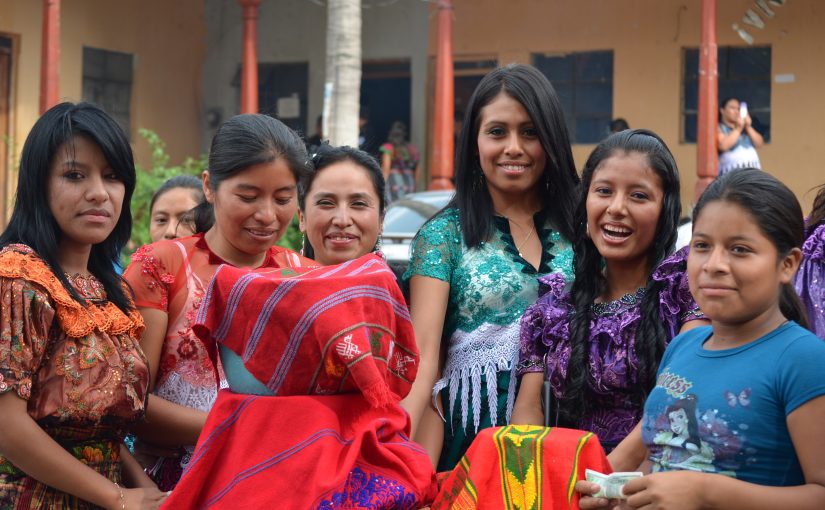In this lesson, you will learn about traditional clothing in Nahualá. Nahualeños are very proud of their traditional vestments, especially women, who still wear it every day. You will also practice the grammar and vocabulary we have studied in the past ten units.
In the following video nan Xe’p describes the traditional clothing women wear in Nahualá. Do not worry about memorizing all of the new vocabulary you hear. Focus instead on the words and constructions you already know.
| powi’ | hat |
| kami’x | shirt |
| ta’k | embroidered collar (on men’s shirts) |
| nim le ta’k. | the collar is big |
| koxtar | male skirt, traditional in Nahualá |
| xyal | cardigan, sweater |
| pantz | trousers |
| ilb’al | glasses |
| ilb’al ramaj | watch |
| po’t | huipil, woven blouse |
| uq (E-uq) | corte, skirt |
| xajab’ | shoe(s) |
| su’t | large woven cloth used as a covering on top of the head or on the shoulder (for women) |
| sutub’al su’t | ceremonial cloth (tied around a man’s head) |
| peraj | large woven cloth (larger than su’t) used to carry babies |
| xkinaj (E-xikin) | ear rings |
| mulq’ab’ | ring |
| chachal | necklace |
| ximb’al -wi'(aj) | hair ribbon |
| pas | woven belt |
| b’ake’t | leather belt worn by men, holds the koxtar in place |
| to’q | diaper |
| b’otz’b’al | long wide woven belt used to wrap infants |
In the following word scramble are several words concerning clothing. Find them and practice their pronunciation and meaning.
| A | Q | J | N | K’ | W | N | X | O’ | J | S | P | A | S | K’ | U | P | B’ | S |
| Y | P | O’ | X | Y | A | L | X | T’ | X | Y | L | TZ | U | R | TZ | O | O’ | U |
| R | J | T’ | X | K’ | W | M | U | P | E | P | R | L | R | X | Y | J | L | T |
| U’ | TZ | X | Q | B’ | R | L | M | O | U | X | E’ | Y | TZ | P | K’ | TZ | L | U |
| U | K’ | Y | Q | J | Q | S | L | W | X | R | M | R | P | U | U | P | W | B’ |
| P | T’ | U | K’ | P | N | O’ | Q | I’ | Y | U’ | M | X | Q | R | K | J | Q | A |
| W | L | L | U’ | T | R | U | B’ | I’ | B’ | J | O | I’ | A | E’ | X | T’ | A | L |
| K’ | T | E | R | R | O | U | B’ | X | P | Q | W | M | E | P | U | P | Y | S |
| P | E’ | Q | S | P | N | P | M | A | Q | S | M | A | T | S | U | O’ | L | U’ |
| K | K | J | R | U | Y | J | X | K | X | Q | Q | K | E’ | K | K | L | Q | T |
| Q | A | X | J | B’ | O’ | N | A | S | T’ | N | R | 0’ | A’ | Q | B’ | R | U’ | Y |
| P | B’ | A | N | S | Y | U | B’ | R | W | Q | N | M | E | M | J | W | T | R |
| T’ | W | TZ | Q | O’ | K’ | P | TZ | U’ | S | L | S | U’ | T | i | Y | S | Q | P |
| O’ | X | W | J | X | N | T’ | X | TZ | W | U | W | K’ | U | J | K’ | E | U | J |
| Q | N | U | X | K | O | X | T | A | R | R | P | Y | O’ | Q | M | U’ | M | T’ |
Word Bank: powi’, pas, uq, xyal, po’t, kami’x, su’t, koxtar, sutub’al sut, b’ake’t.
Translate the following sentences to English:
- K’o umulq’ab’ le al Xwa’n.
- Nim le b’otz’b’al ne’.
- Je’l taq le xkinaj.
- K’o ximb’al uwi’ le al To’n.
- Paqal rajil le chachal.
Answers
- Juana has a ring.
- The cloth for wrapping the babies is big.
- The earrings are pretty.
- Antonia has a hair tie.
- The necklace is expensive.

